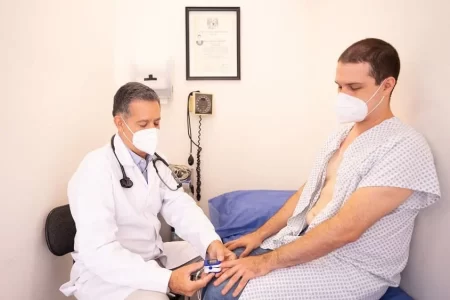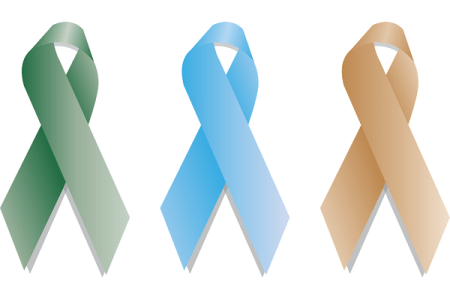What Causes Prostate Cancer and What Are the Risk Factors?
- Updated on: Jul 9, 2024
- 4 min Read
- Published on Feb 21, 2021

According to the Urology Care Foundation, prostate cancer is the second most common cause of all cancer-related deaths among American men. It is estimated that about 1 in 7 men will be diagnosed with the disease sometime in their life, and about 1 in 39 men will die from it. Most of the deaths occur in men of old age.
Causes of Prostate Cancer
As is with most of the cancers, the exact cause of prostate cancer is not known. Sometimes, it is due to the interplay of multiple factors such as genetics, environmental reasons, and exposure to radiations etc.
It is however known that mutations in the DNA of your normal prostate cells are responsible for the growth of cancerous cells and the development of prostate cancer. DNA is the chemical in our cells that builds up our genes. The genes control how our cells work. The changes in DNA can either be inherited from a parent or can be acquired.
Inherited Gene Mutations
Certain mutations in our genes are passed from generation to generation. These mutations are known as inherited mutations. 5% to 10% of cancers belong to this category where a person inherits the genes with mutations. Such a cancer that is caused by inherited genes is called hereditary cancer.
Researchers have linked several inherited mutated genes linked to prostate cancer such as:
- RNASEL
- BRCA1 and BRCA2
- DNA mismatch repair genes (such as MSH2 and MLH1)
- HOXB13
Acquired Gene Mutations
Certain gene mutations happen during a person’s lifetime and are not passed on to children. These types of mutations are called acquired mutations. Most gene mutations related to prostate cancer belong to this category and seem to develop during one’s life rather than having been inherited from parents.
Sometimes, androgens (male hormones), such as testosterone, can cause prostate cells growth. If you have higher levels of androgens, it might contribute to prostate cancer risk.
Some research has found that men with high levels of a hormone – insulin-like growth factor-1 (IGF-1), are more likely to cause prostate cancer. But, some studies have not found such an association.
Researchers say that inflammation in the prostate may also contribute to prostate cancer. It is believed that inflammation may lead to cell DNA damage, which may then cause a normal cell to become a cancer cell. However, this is not proved through evidences and there are mixed results. More research is needed in this area.
Risk Factors for Prostate Cancer
It is not known exactly what causes prostate cancer. However, researchers say that a number of things can increase your risk of developing the cancer. These are known as risk factors and are outlined below:
Age
Age is one of the biggest risk factors for prostate cancer (in fact for several other types of cancers also). Prostate cancer rarely develops in young men. The Prostate Cancer Foundation says that only 1 in 10,000 men under the age of 40 in the United States will develop prostate cancer. The number significantly increases to 1 in 38 for men between the ages of 40 and 59. It further jumps to 1 in 14 men between the ages of 60 and 69. Most of the prostate cancer cases are diagnosed in men over the age of 65.
| Age | Incidence of Prostate Cancer |
|---|---|
| Less than 40 years | 1 in 10,000 men |
| 40-59 years | 1 in 38 men |
| 60-69 | 1 in 14 men |
Race
The reasons are not known fully, but black men are at a greater risk of developing prostate cancer than men of other races. Prostate cancer is more likely to be aggressive or advanced in black men as compared to people of other ethnicity or race. The outcome is also poor in black men.
According to the American Cancer Society, Asian-American and Latino men have the lowest incidences of prostate cancer in the United States. African-American men are more likely to develop it than men of other races and ethnicities.
Diet
The exact role of diet in the development and progression of prostate cancer is not completely understood. But it is considered that men who eat a lot of red meat or high fat products have a slightly higher chance of getting the prostate cancer. Also, men who tend to eat lesser quantity of fruits and vegetables are at higher risk.
Some studies suggest that men who consume sufficient amounts of calcium may have a higher risk of prostate cancer. Dairy foods (which are generally high in calcium) may also increase the risk. But most studies have not found any such a link of prostate cancer with the intake of calcium. Therefore, you should not reduce calcium intake unless your doctor recommends because calcium is known to have other important health benefits.
Additional research is ongoing into the association between diet and prostate cancer.
Obesity
Some recent studies suggest that there may be a link between obesity and prostate cancer. Obese men diagnosed with prostate cancer are more likely to have advanced prostate cancer that is difficult to treat. Their condition is more aggressive than those who are not obese, in general.
Family History
According to the American Cancer Society, about 5-10 percent of prostate cancer cases are caused by inherited mutations. It is associated with inherited mutations in several different genes as discussed above.
If any male member in your family has had prostate cancer, your risk of developing the prostate cancer may be higher. If you have a family history of genes that increase the risk of breast cancer (such as BRCA1 or BRCA2), even then your risk of developing the prostate cancer is higher.
Geography
Your area of living can also influence your risk of developing prostate cancer. Asian men who live in America have a lower incidence of the disease than those of other races. Asian men living in Asia are very less likely to develop it.
According to a report from the American Cancer Society, prostate cancer is more common in North America, the Caribbean, northwestern Europe, and Australia than it is in Asia, Africa, Central America, and South America.
According to The Prostate Cancer Foundation men living in the United States at north of 40 degrees latitude are at a higher risk of developing the prostate cancer and dying from it than those living farther. This is attributed to Vitamin D by researchers, and accordingly vitamin D is considered to decrease the risk of cancer.
Risk Factors for Aggressive Prostate Cancer
Aggressively growing prostate cancers are different from slowly-developing cancers. Researchers have associated certain risk factors with aggressive advancement of the prostate cancer. Your risk of developing an advanced prostate cancer faster may be higher if:
- You are obese
- You smoke
- You have a sedentary lifestyle
- Your activity level is low and do not spend time on exercises
- You consume high levels of calcium – though the studies show mixed results












